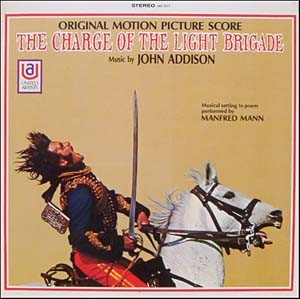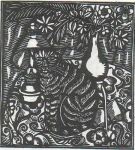06/09/2009
The rising of the moon
And come tell me Sean O'Farrell where the gath'rin is to be
At the old spot by the river quite well known to you and me
One more word for signal token whistle out the marchin' tune
With your pike upon your shoulder by the rising of the moon
By the rising of the moon, by the rising of the moon
With your pike upon your shoulder by the rising of the moon
Paroles : J.K. Casey
Musique : Turlough O'Carolan
12:06 Publié dans Morceaux en forme de poire | Lien permanent | Commentaires (0) | Tags : irlande, poésie |  |
|  del.icio.us |
del.icio.us | ![]() Facebook
Facebook
14/02/2009
De peur que je n'apprenne ...
De peur que je n'apprenne à te connaître trop facilement,
tu joues avec moi.
Tu m'éblouis de tes éclats de rire pour cacher tes larmes.
Je connais tes artifices.
Jamais tu ne dis le mot que tu voudrais dire.
De peur que je ne t'apprécie pas, tu m'échappes de cent façons.
De peur que je te confonde avec la foule, tu te tiens seule à part.
Je connais tes artifices.
Jamais tu ne prends le chemin que tu voudrais prendre.
Tu demandes plus que les autres, c'est pourquoi tu es silencieuse.
Avec une folâtre insouciance, tu évites mes dons.
Je connais tes artifices.
Jamais tu ne prends ce que tu voudrais prendre.
Rabindranath Tagore
Le Jardinier d'amour, XXXV
10:01 Publié dans Saines lectures | Lien permanent | Commentaires (2) | Tags : poésie, rabindranath tagore |  |
|  del.icio.us |
del.icio.us | ![]() Facebook
Facebook
13/04/2008
Salut et meilleurs voeux de santé
Partir.
Comme il y a des hommes-hyènes et des hommes-
panthères, je serais un homme-juif
un homme-cafre
un homme-hindou-de-Calcutta
un homme-de-Harlem-qui-ne-vote-pas
l'homme-famine, l'homme-insulte, l'homme-torture
on pouvait à n'importe quel moment le saisir le rouer
de coups, le tuer - parfaitement le tuer - sans avoir
de compte à rendre à personne sans avoir d'excuses à présenter à personne
un homme-juif
un homme-pogrom
un chiot
un mendigot
mais est-ce qu'on tue le Remords, beau comme la
face de stupeur d'une dame anglaise qui trouverait
dans sa soupière un crâne de Hottentot ?
Aimé Cesaire
Cahier du retour au pays natal
12:33 Publié dans Ici et maintenant | Lien permanent | Commentaires (0) | Tags : aimé cesaire, poésie |  |
|  del.icio.us |
del.icio.us | ![]() Facebook
Facebook
04/05/2007
Anniversaire
Certes, nous aurions pu les convaincre et les conquérir,
Car l'angoisse de l'ouragan est émouvante.
Oui, l'ouragan allait bientôt venir ;
Mais cela valait-il la peine que l'on en parlât et qu'on dérangeât l'avenir ?
Là où nous sommes, il n'y a pas de crainte urgente.
René Char
1907 - 1988
14:35 Publié dans Saines lectures | Lien permanent | Commentaires (0) | Tags : René Char, poésie |  |
|  del.icio.us |
del.icio.us | ![]() Facebook
Facebook
23/11/2006
La réponse de Kipling
There were thirty million English who talked of England's might,
There were twenty broken troopers who lacked a bed for the night.
They had neither food nor money, they had neither service nor trade;
They were only shiftless soldiers, the last of the Light Brigade.
They felt that life was fleeting; they knew not that art was long,
That though they were dying of famine, they lived in deathless song.
They asked for a little money to keep the wolf from the door;
And the thirty million English sent twenty pounds and four!
They laid their heads together that were scarred and lined and grey;
Keen were the Russian sabres, but want was keener than they;
And an old Troop-Sergeant muttered, "Let us go to the man who writes
The things on Balaclava the kiddies at school recites."
They went without bands or colours, a regiment ten-file strong,
To look for the Master-singer who had crowned them all in his song;
And, waiting his servant's order, by the garden gate they stayed,
A desolate little cluster, the last of the Light Brigade.
They strove to stand to attention, to straighten the toil-bowed back;
They drilled on an empty stomach, the loose-knit files fell slack;
With stooping of weary shoulders, in garments tattered and frayed,
They shambled into his presence, the last of the Light Brigade.
The old Troop-Sergeant was spokesman, and "Beggin' your pardon," he said,
"You wrote o' the Light Brigade, sir. Here's all that isn't dead.
An' it's all come true what you wrote, sir, regardin' the mouth of hell;
For we're all of us nigh to the workhouse, an, we thought we'd call an' tell.
"No, thank you, we don't want food, sir; but couldn't you take an' write
A sort of 'to be continued' and 'see next page' o' the fight?
We think that someone has blundered, an' couldn't you tell 'em how?
You wrote we were heroes once, sir. Please, write we are starving now."
The poor little army departed, limping and lean and forlorn.
And the heart of the Master-singer grew hot with "the scorn of scorn."
And he wrote for them wonderful verses that swept the land like flame,
Till the fatted souls of the English were scourged with the thing called Shame.
O thirty million English that babble of England's might,
Behold there are twenty heroes who lack their food to-night;
Our children's children are lisping to "honour the charge they made-"
And we leave to the streets and the workhouse the charge of the Light Brigade!
Rudyard Kipling
23:30 Publié dans Saines lectures | Lien permanent | Commentaires (0) | Tags : littérature, poésie, Rudyard Kipling |  |
|  del.icio.us |
del.icio.us | ![]() Facebook
Facebook
21/11/2006
Chargez !
Texte du poème d’Alfred Tennyson inspiré par le fameux épisode de la charge de la brigade légère, mis en musique par John Addison et interprété par Manfred Mann à l’occasion du beau film de John Richardson en 1968.

1.
Half a league, half a league,
![]() Half a league onward,
Half a league onward,
All in the valley of Death
![]() Rode the six hundred.
Rode the six hundred.
"Forward, the Light Brigade!
"Charge for the guns!" he said:
Into the valley of Death
![]() Rode the six hundred.
Rode the six hundred.
2.
"Forward, the Light Brigade!"
Was there a man dismay'd?
Not tho' the soldier knew
![]() Someone had blunder'd:
Someone had blunder'd:
Their's not to make reply,
Their's not to reason why,
Their's but to do and die:
Into the valley of Death
![]() Rode the six hundred.
Rode the six hundred.
3.
Cannon to right of them,
Cannon to left of them,
Cannon in front of them
![]() Volley'd and thunder'd;
Volley'd and thunder'd;
Storm'd at with shot and shell,
Boldly they rode and well,
Into the jaws of Death,
Into the mouth of Hell
![]() Rode the six hundred.
Rode the six hundred.
4.
Flash'd all their sabres bare,
Flash'd as they turn'd in air,
Sabring the gunners there,
Charging an army, while
![]() All the world wonder'd:
All the world wonder'd:
Plunged in the battery-smoke
Right thro' the line they broke;
Cossack and Russian
Reel'd from the sabre stroke
![]() Shatter'd and sunder'd.
Shatter'd and sunder'd.
Then they rode back, but not
![]() Not the six hundred.
Not the six hundred.
5.
Cannon to right of them,
Cannon to left of them,
Cannon behind them
![]() Volley'd and thunder'd;
Volley'd and thunder'd;
Storm'd at with shot and shell,
While horse and hero fell,
They that had fought so well
Came thro' the jaws of Death
Back from the mouth of Hell,
All that was left of them,
![]() Left of six hundred.
Left of six hundred.
6.
When can their glory fade?
O the wild charge they made!
![]() All the world wondered.
All the world wondered.
Honor the charge they made,
Honor the Light Brigade,
![]() Noble six hundred.
Noble six hundred.
Poems of Alfred Tennyson, J. E. Tilton and Company, Boston, 1870
06:30 Publié dans Saines lectures | Lien permanent | Commentaires (0) | Tags : Poésie, Alfred Tennyson |  |
|  del.icio.us |
del.icio.us | ![]() Facebook
Facebook
21/12/2005
Aimé Cesaire
Je suis venu tout récemment à Aimé Cesaire via Gaston Keljman et son livre « Je Suis Noir et Je N'aime Pas le Manioc » qui le cite fréquemment. De Cesaire, je connaissais le nom mais ni l'homme ni son oeuvre. Martiniquais, Maire de Fort de France pendant 56 ans, poète, député et rapporteur de la loi faisant des colonies de Guadeloupe, Guyane Française, Martinique et la Réunion, des Départements Français en 1946, créateur de la revue Tropiques, théoricien de la négritude, communiste lucide donc démissionnaire, homme de théâtre, patriarche respecté, il est aussi l'homme qui vient de refuser de recevoir Nicolas Sarkozy. Total respect comme on dit à Juvisy.
Au moment où, après la crise des banlieues et la mauvaise digestion par la France de son passé colonial, le débat revient vivement sur les valeurs fondamentales de notre république, la parole de Aimé Cesaire est précieuse.
Il s'agit de savoir si nous croyons à l'homme et si nous croyons à ce que l'on appelle les droits de l'homme. A liberté, égalité, fraternité, j'ajoute toujours identité. Car, oui, nous y avons droit.
Ces paroles sonnent juste. Coïncidence, vient de sortir un livre « Nègre je suis, Nègre je resterais », livre d'entretien avec Françoise Vergès, réunionaise, professeur de science politiques à l'université de Londres et vice-présidente du Comité pour la mémoire de l'esclavage. Sur ce sujet :
La réparation, c'est une affaire d'interprétation. Je connais suffisamment les occidentaux : alors mon cher, combien? Je t'en donne la moitié pour payer la traite. D'accord ? Tope-là » Puis c'est fini, ils ont réparé. Or, selon moi, c'est irréparable.
Le livre s'achève sur une postface qui rattache les écrits de Cesaire à notre actualité et aux problématiques de la postcolonisation. De quoi réfléchir. Cesaire fait partie de ces hommes que nous avons eu la chance d'avoir et de conserver. Je pensais à cela après avoir vu le film sur Ben Barka et acheté le texte de la pièce de théâtre que Cesaire a écrite autour de Lumumba : « Une Saison au Congo ». Deux hommes progressistes, démocrates, intelligents, qui ont été éliminés par des pouvoirs imbéciles et violents. Deux hommes rares qui ont manqué. Aimé Cesaire est bien là. J'ai commencé son recueil de poésies « Les Armes miraculeuses ». Une poésie aux images fortes, riches et colorées. Une poésie violente et sensuelle aussi :
Mes yeux d'encre de chine de Saint-Pierre assassiné
Mes yeux d'exécution sommaire et le dos au mur
Mes yeux qui s'insurgent contre l'édit de grâce
Mes yeux de Saint-Pierre bravant les assassins sous la cendre morte.
En savoir plus le site de l'exposition organisée par l'Unesco. Un autre site avec des extraits de « Carnet du retour au pays natal », son oeuvre phare.
06:40 Publié dans Saines lectures | Lien permanent | Commentaires (0) | Tags : littérature, poésie, Aimé Césaire |  |
|  del.icio.us |
del.icio.us | ![]() Facebook
Facebook
03/07/2005
Coup de chapeau
14:15 Publié dans Saines lectures | Lien permanent | Commentaires (0) | Tags : poésie, Apollinaire |  |
|  del.icio.us |
del.icio.us | ![]() Facebook
Facebook






